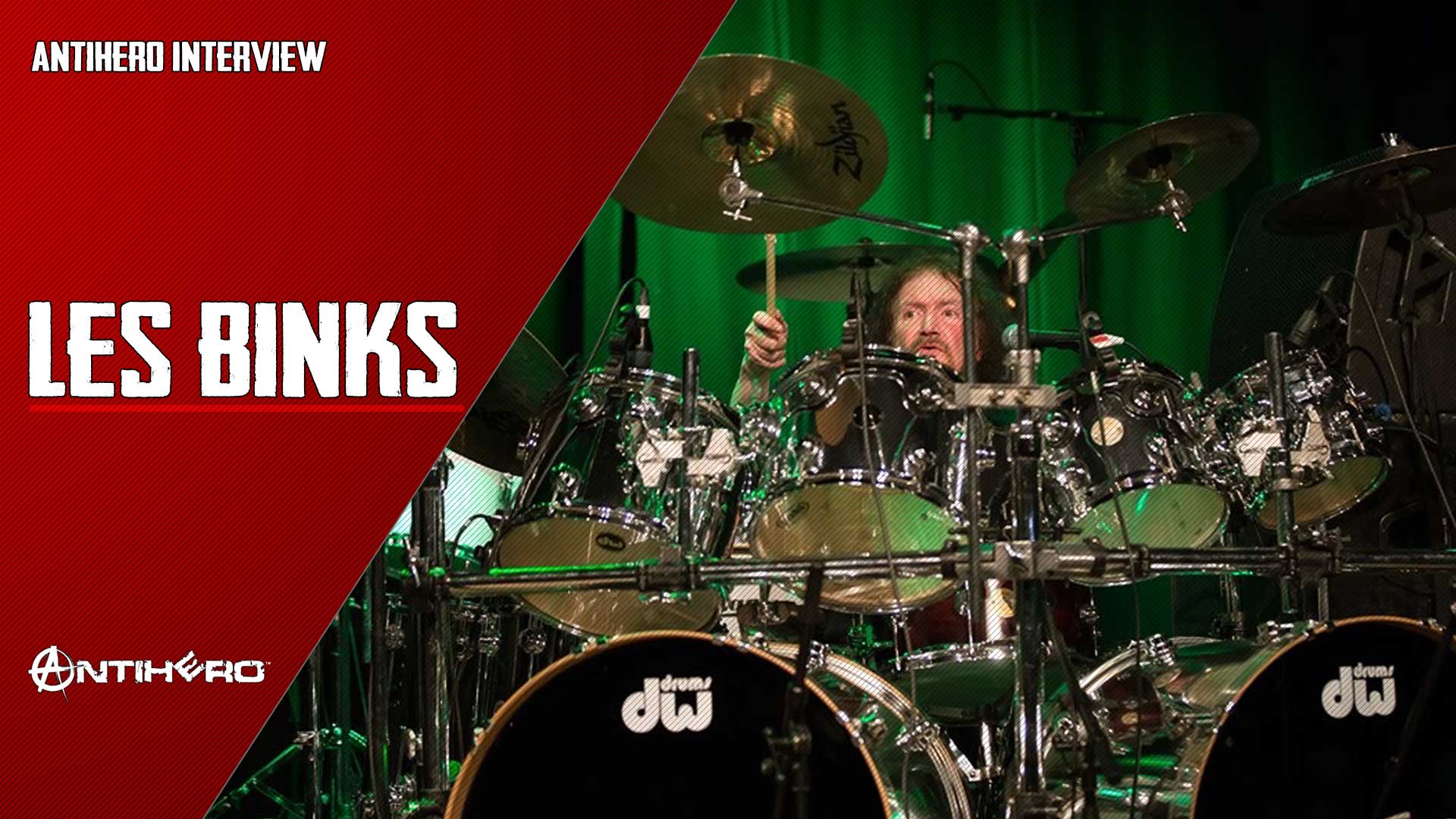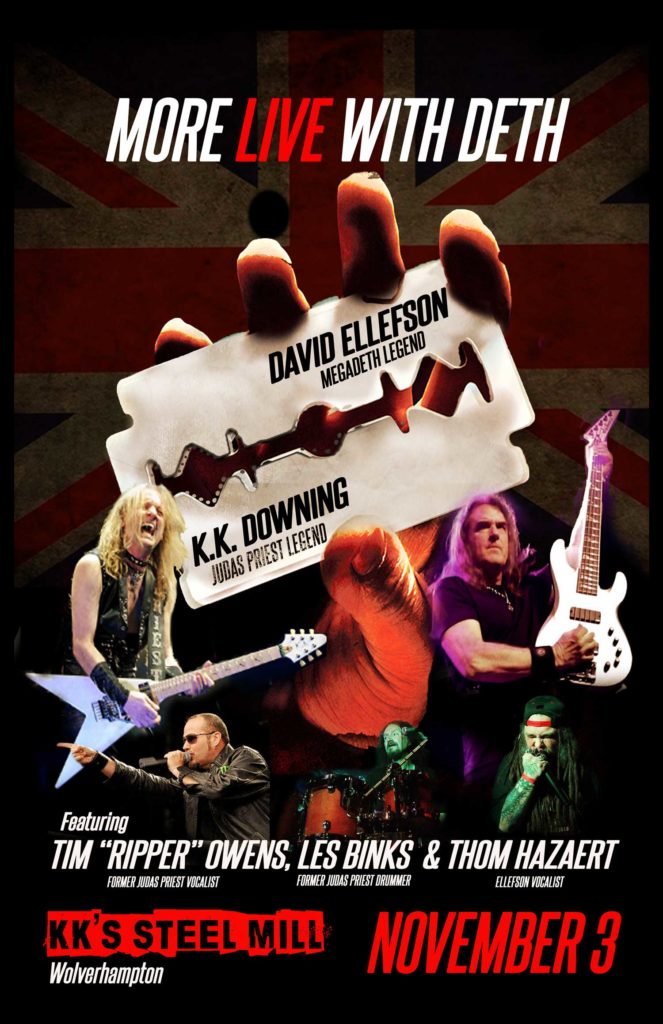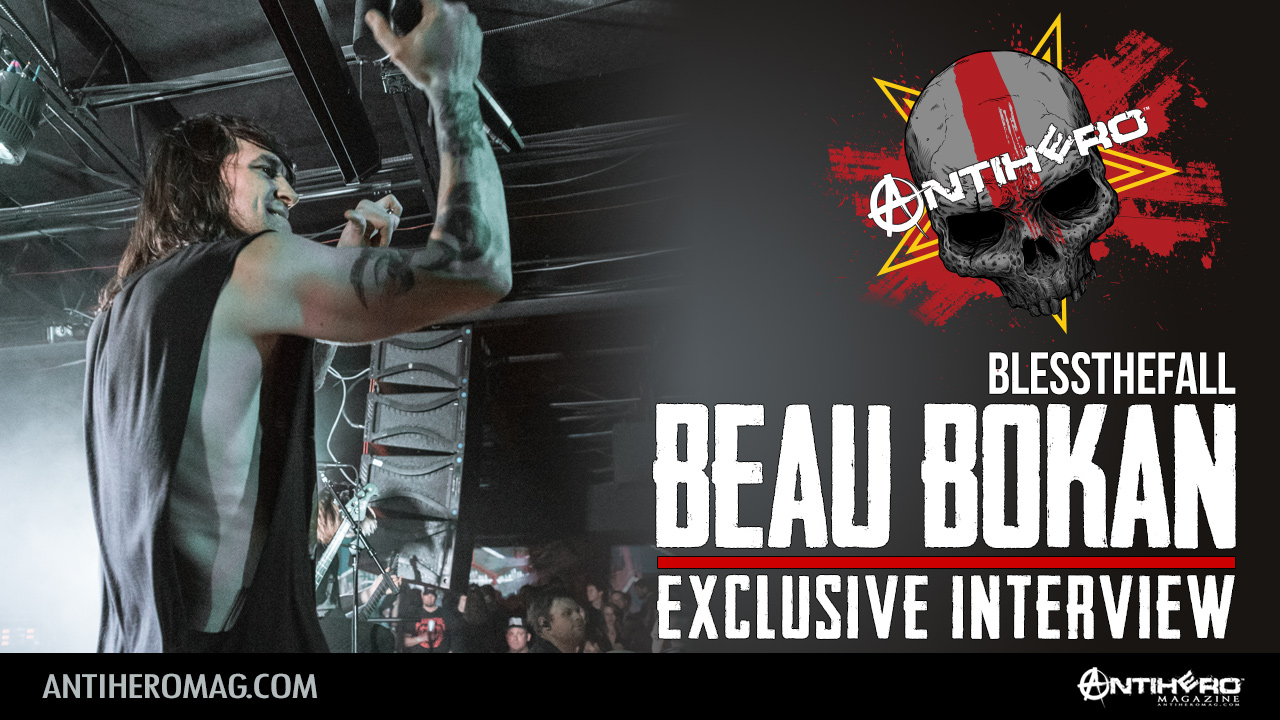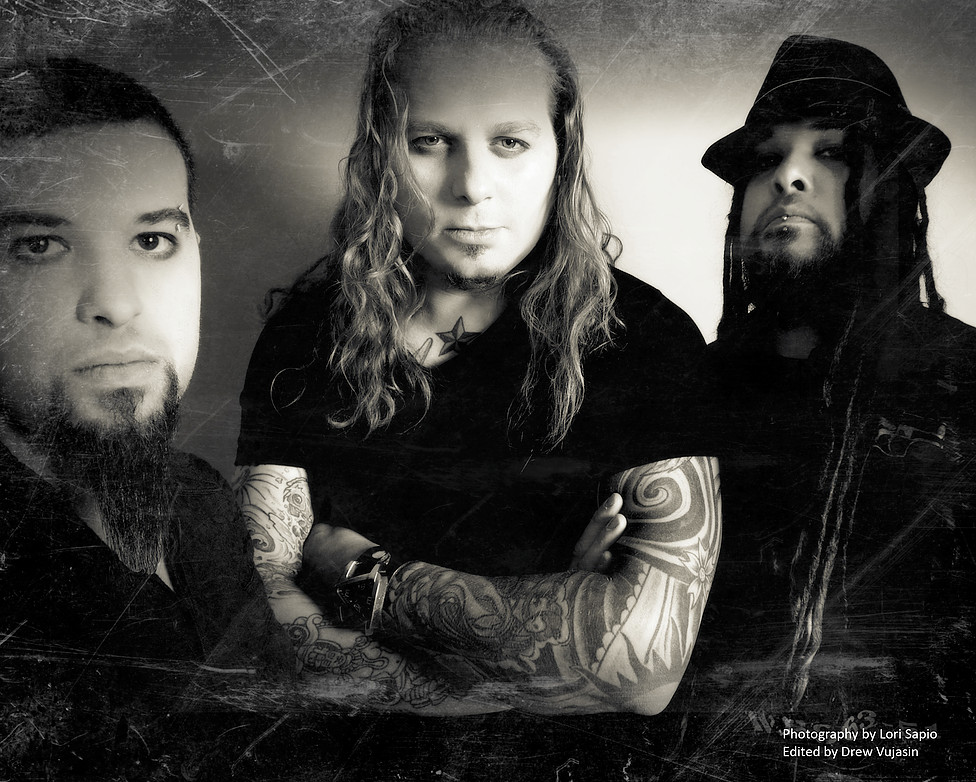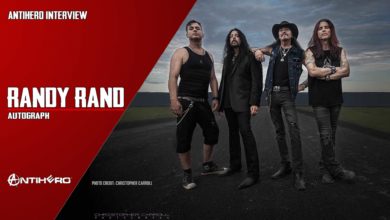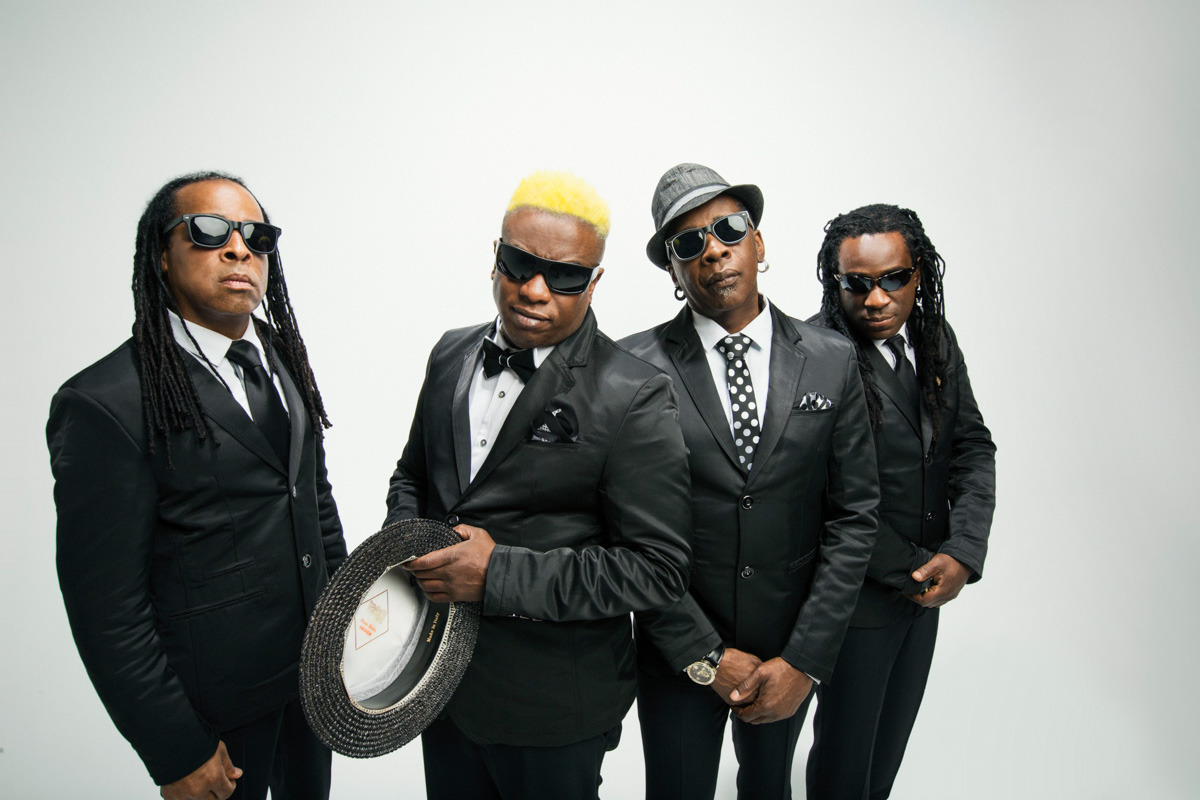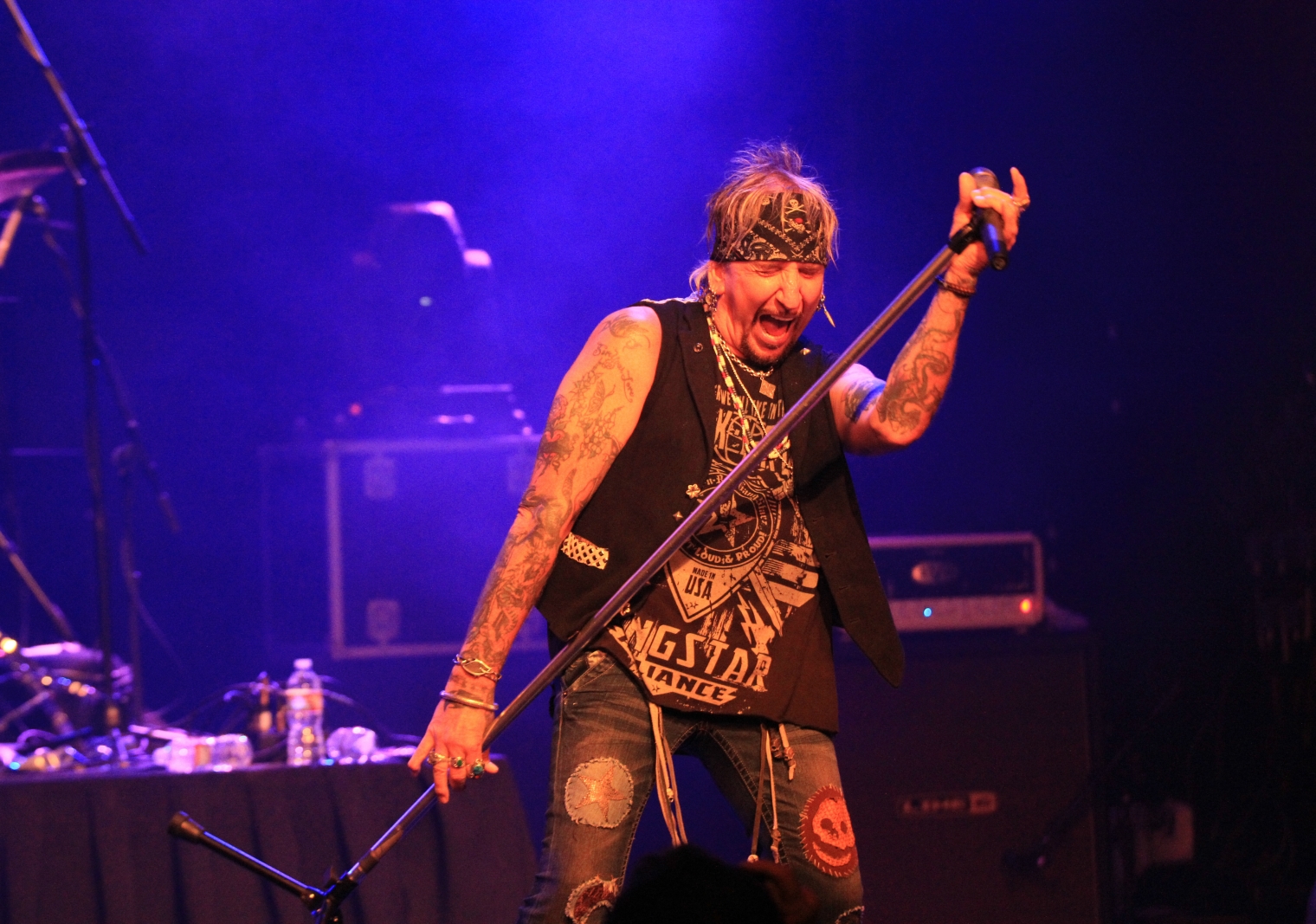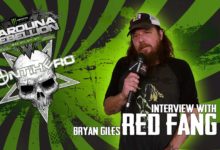Megadeth legend David Ellefson is coming to the U.K. for a brace of shows, including a special one-off, featuring legendary former Judas Priest guitarist KK Downing, alongside two other ex-Priest legends; Tim ‘Ripper’ Owens and Les Binks!
In the first of several interviews involving the musicians playing that show, I tracked down Les for a chat where he outlined his musical career from those early showband days in Northern Ireland, right up to the forthcoming special show at the Steel Mill in Wolverhampton.
ANTIHERO: I’m ringing to talk about this special one-off concert that you’re doing, Wolves. Just wondering how it came together. Who came up with the concept, who came up with the lineup?
Les Binks: I had an email from K.K. asking me if I’d be up for doing it. I think it is sort of connected with his friendship with David Ellefson from Megadeth. They’ve known each other for quite a while. I think they toured together quite a lot so they became friends over a period of time and David has a book out at the moment which he’s promoting and he has his own little band as well. And he’s doing a tour of Europe, so I think as K.K. has his own venue now, K.K.’s Steel Mill, in Wolverhampton. He suggested doing a book signing there and doing some stuff with his band, and then the idea came about of actually getting K.K. onstage as well. And then, of course, K.K. and I reconnected a couple of years back. We hadn’t seen each other in quite a long time. I thought it would be nice for us to do something together again actually after all this time it would be a nice idea. He was heavily involved in his golf course at the time-And I think he had his finger in a lot of different pies. But we did do a recording together with Paul Crook who’s a guitarist and producer of Meat Loaf. He approached me, he’s involved with a company called Devil Star. And there are many sides to that organization but one of them is music and recording. And he asked me if I would be interested in doing a one-off recording project with them. So, I suggested redoing Beyond the Realms of Death, which is a song I wrote with Rob Halford. I wrote the music and Robert wrote the lyrics for that song.I thought it would be nice to put a new twist on it. So, there are a few little aspects of it which I played slightly differently but the essence of the song’s exactly the same. So, that was put together and then we had to get a singer and I thought because Paul Crook is an excellent guitar player himself, as he used to be with Anthrax.
ANTIHERO: I am familiar with his work with them.
Les Binks: And so, he played the middle solo which was originally done by Glenn Tipton on the original recording. It was around about the same time that I had sort of hooked up with K.K. again. So, I gave him a call and said “Look,” I explained about this project and would he be interested in playing his solo section which is on the outro of the song and he agreed to it. So that was two of us, two former members of Priest on the track and then, of course, the obvious person to ask to be the vocals was Tim “Ripper” Owens who was in the band for quite a while as well.
ANTIHERO: So, that formed the origins for this show that is coming up?
Les Binks: I never met Tim before he joined the band long after I left. But it just so happened that he was doing a gig at the Underworld in Camden and so I went along and met up with him and in fact, he actually invited me onstage and I did three songs with him just off the top of my head. So we had a long chat afterward backstage and swapped contact details and et cetera and so I asked him if he would sing on it. That put the three of us together on a recording but not as a live band. So that came out on Devil Star as a download, you can get that on all the usual channels. iTunes all that sort of stuff. So as I say, it was when David Ellefson decided to come over and do some stuff in Europe and do something at K.K.’s venue that the idea of putting the three of us together came about. We’ve also got another guitar player in the band as well, a guy called A.J. Mills who’s in a band called Hostile which is from the same part of the world that K.K. originates from.
ANTIHERO: Yeah. I see
Les Binks: It’s a young metal band that he is very impressed with and so he got involved with them as kind of mentoring, I think he played a couple of solos on their album and produced it for them as well. So he’s going to be joining us as the second guitar player. I’m looking forward to that. I haven’t met him yet so I’m looking forward to that.
ANTIHERO: What about in terms of setlists or songs? You guys going to be doing any rehearsals because it’s going to be a huge media presence there and obviously a lot of focus on that one-off gig?
Les Binks: Oh yes, of course, We will, the three of us, me, K.K. and A.J. will be rehearsing prior to the arrival of Ripper and David. Because I think they’re just coming over a day or so before the actual gig. So we’ll have limited rehearsal time with them but we will have all the songs and everything sorted out between us before they arrive. But, of course, Ripper knows all that stuff anyway so he should be able to just slot in straight away.
ANTIHERO: It’s obviously billed as a one-off. Are you guys just going to wait and see how it pans out or you have any long-term plans to maybe do a few more gigs? Lots of fans are expressing wishes for something more permanent.
Les Binks: Well, I think when the news broke out that we had got together initially just to record. There were a lot of people, a lot of Priest fans that were suggesting that they’d like us to do a more permanent band situation.
ANTIHERO: Exactly. It seems to have created a massive buzz on all the music news sites.
Les Binks: And as I explained before, at the time I don’t think K.K. was in the right frame of mind for… Any more with the golf course situation (a former business opportunity that didn’t work out).
ANTIHERO: I can understand the subsequent reservations, in terms of committing to anything long-term.
Les Binks: Because he was at the time, considering building a hotel there as well. It’s obviously been a lot of interest in this gig. I think it’s just a matter of seeing what the connection is, seeing what the reaction is, seeing how this all goes off. And if everyone wants to do more of the same mindset, we want to do something else, well, we’ll discuss that between us and decide whether that’s something we want to do or not. But at the moment it’s just a one-off.
ANTIHERO: How do you find it as a musician, I mean, that time in Priest was only a small part of what has been a long career. Does that annoy you, that people just want to talk about that period with Priest?
Les Binks: I think it’s a bit like an actor, some actors when they get into a particular role they get typecast in that role and the same thing can apply to musicians, I think, where you’ve been in a high profile metal band you get sort of labeled with that.
ANTIHERO: It overshadows whatever you do next.
Les Binks: I mean, I never thought in those days that the band would still be active in 2019.
ANTIHERO: I can imagine.
Les Binks: Rob’s fans, the whole thing was evolving throughout the ’60s and ’70s and you didn’t know any rock musicians who were in their 60s or 70s. Now, of course, you’ve got the Rolling Stones still out touring and such all in their 70s. Even McCartney still, he’s 76 or something, I think.
ANTIHERO: There are certainly few musicians still around and doing it in the business, certainly in terms of regularly playing live and touring globally.
Les Binks: But back then I didn’t really see that. Most people thought that your career in music would be over by the time you hit 30. If anyone had said to me, back in the ’70s, that Judas Priest would still be active in the year 2019, I would have openly laughed at them. But times change, and you get people like B.B. King for instance, who toured, he was in his 80s I think he was still performing. He’s going on stage in a wheelchair. I think if you’ve got the music in your blood, it’s hard to shake it off, you know? You just keep doing it for as long as you can, you’re physically able to do it, you know.
ANTIHERO: What about growing up Northern Ireland? I know when I started getting into music it was the ’80s, and not many bands were coming over and playing there. What was your first introduction to music?
Les Binks: I didn’t come from a musical family, which is kind of weird, because nobody else in my family is in any way musically inspired to do anything. I think it was because I really got into the music of the Beatles at the time, Beatles made a big impression on me and their music was quite varied as well. You couldn’t really sort of bag the Beatles in terms of the genre, they were quite a versatile band musically. I just seemed to be drawn to playing drums and I think I was about 12 at the time, I joined a brass band. It was a church band that was actually a silver band, what they called a silver band, all the brass instruments were coated in a silver coat. That was just playing the snare drum and of course, I had to rehearse with that band, it was all marches that they’d play and military-style marches. That taught me to read music, read the drum parts which was beneficial to me later on when I started doing session work because you have to be able to read, helps so you can read parts. So that started me off and I got the rudimental side of playing drums together because you had to learn five-stroke rolls, nine-stroke rolls, paradiddles, all that sort of stuff. So, that set me up in terms of the rudiments, and then I met up with some other local guys, when I was about the same age, roughly 12, 13, they were getting interested in music, bought themselves guitars, et cetera. So, we formed a little band and we all wanted to play all the music of that day and that era. And then, later on, I joined a professional show band, it was a big show band in Ireland, both North and South. I joined a band called Derek and the Sounds and they were based in Fintona which is near Omagh. N.Ireland .So, I used to have to go up and stay up there. We’d play all over Ireland. That was the first professional band that I joined actually making a living for the first time as a professional musician. The former rhythm section in that band, the bass player and drummer left Derek and the Sounds to form Taste with Rory Gallagher. That was John Wilson on drums. Richard McCracken on bass. They were both, they were the rhythm section in that band before I joined.
ANTIHERO: Those early influences are quite far removed compared to what you subsequently did with Judas Priest.
Les Binks: Well, it’s not really because when I was working with the show band, we had to learn a whole range of material, whatever happened to be in the charts at the time. I remember playing some Deep Purple stuff because Deep Purple had a couple of hit singles about that period. Now I wouldn’t consider Deep Purple a metal band as such, sort of hard rock. So, that got me into playing that style because we had to play a whole variety of stuff, ballads and all kinds of stuff. So, you had to be a pretty versatile musician to work in a show band. Then when I moved to London, there are two reasons for that, one was London was the heart of the music scene in the U.K. so if you wanted to do anything seriously you’d have to relocate there and secondly, of course, the Troubles in Northern Ireland were getting a bit hairy.
ANTIHERO: Yeah, of course.
Les Binks: That really affected the entertainment scene.
ANTIHERO: I know exactly what you mean, having lived through those years growing up myself turbulent times.
Les Binks: It made it less pleasurable to perform. It seemed to be getting more dangerous, so it made sense to make the move around that time. When I moved to London, I actually knew nobody here at all. I had to find my own way. I met up with some other musicians who were on the session scene, the studio scene in London. Through getting involved with them, we were asked to do a session for a guy called Mike Hurst who produced Showaddywaddy and all those other bands. He also produced, what’s his name, Cat Stevens. We recorded a version of Wild Thing as a session band and got a girl singer in to do the vocals on it. And it was put out under the name Fancy, but the band as such didn’t really exist as a gigging band. We were just a bunch of session guys. It was released on the Atlantic label in America and got in the top ten in America. But unfortunately the BBC banned it in the U.K.If you go back to that period there was a lot more, the BBC was very strict back then. They thought the vocal performance with a girl was a bit too provocative. So, they banned it. But we had a hit single in America with that, so we went over and toured America, did some TV shows over there. We did a week at the Whiskey a Go-Go in L.A. A lot of musicians turned up there, that was a favorite haunt for rock musicians. Rory Gallagher came over at one point. During that stint. That band actually was a session band initially with 10cc around the time they had I’m Not in Love, a big hit single they had. It was on an album called the Original Soundtrack. So we were supporting 10cc on that tour of the U.K. and Roger Glover saw the band somewhere, the bass player from Deep Purple. At that particular time, Roger was out of the band, he was not in the band, so he was working on a solo album and he asked us if we would play on it. So we became the rhythm section on that album called the Butterfly Ball and it’s very different from what he was doing with Deep Purple. When the album came out, there’s a lot of people on that album, a lot of guest singers and big names with Ronnie James Dio and David Coverdale singing on some of the tracks. Ian Gillan-It was on an album called the Original Soundtrack When the album came out, there’s a lot of people on that album, a lot of guest singers and big names with Ronnie James Dio and David Coverdale singing on some of the tracks. Ian Gillan…
ANTIHERO: That’s quite a formidable lineup of musicians right there.
Les Binks: We did a follow-up concert at the Royal Albert Hall and we had what’s his name, Vincent Price, the actor. Up in the royal box doing the narration in between each song because the song was based on a book, a story And so he did a little bit of narration in between each song. We had Twiggy, as well, singing one of the songs. We had a full choir and orchestra, so it was quite a big production. A lot of people involved in that and funny enough, Ian Paice came down. Obviously, a lot of the Deep Purple guys were involved, and we had John Lord on keyboards as well. On one or two of the songs. Oh, Ian Paice came backstage afterward, the first time I’d met Ian, he was one of my influences as well.
ANTIHERO: So, from playing Deep Purple covers in bands in N.Ireland you went to actually create music with some of those bands musicians.
Les Binks: He was one of the guys whose drumming I admired in those days. Along with John Bonham and several other guys. It’s funny because I did a gig with Ian Paice recently in France in a place called….. because when he’s not working with Deep Purple rather than stay at home and just practice to keep his chops together he prefers to go out and play live to a live audience. So there’s a band that he hooks up with a band called Perpendicular.
ANTIHERO: I am aware of that band.
Les Binks: Yeah, and so they just play all the same stuff that he played with Deep Purple. We were doing a gig together in France and it was nice to see him again. I hadn’t seen him for many years as well. Anyway, getting back to the session thing- We were working with lots of different people in the studios. Quite often you would just turn up and be booked into a session for someone and you wouldn’t know in advance what the music was going to be, you signed up and you got to the studio, maybe they had a little home demo they’d made of a song or just play it to you on the acoustic guitar or piano. So you had to be inventive, you had to come up with strong part to complement the music and try to get the best out of it. You had to be versatile. It helped if you read music as well.
I was asked to do a tour with Eric Burdon, the lead singer from the Animals as well around this particular time. I’d just finished doing that and I was contacted about the Judas Priest thing. Because there was a link there with Roger Glover because at that point, Judas Priest had only made two albums and they were both on a very small record label called Gull. Gull Records and it was at a time when punk was just starting to happen in the U.K.
Bands like the Sex Pistols and whatever were just hitting the scene. So, I think the record companies were not so much promoting metal bands at that point because they thought this is going to be the next big thing. So, we were kind of out of favor at the time. The band had just signed up to a new management company and they got them a new record deal worldwide with CBS Columbia. They went in to make the next album, their first album for CBS and for some reason they parted company with their drummer. If you look at the first two albums, the first one was called “Rocka Rolla” and the second one was “Sad Wings of Destiny”. On both of those albums, there are two different drummers. So, they changed drummers between the first album and the second album and now they’re doing their first album, the third album, for CBS and they’d parted company with that drummer as well.
They hired Roger Glover to produce the album. Roger hired Simon Phillips to do that album. I think it was the first time they had a double bass drum set up in the band. Simon was using two bass drums then. I think he was the first one to introduce that. I think they actually asked Simon to join the band permanently, but he was heavily into the session scene. He liked the challenge of working with a lot of different artists and stuff. Which is quite a nice thing to do as well. So, he had other commitments lined up. I think he was going off on a tour with the Jack Bruce Band. So, he couldn’t join them. They just recorded the album. So, then they had a British tour set up up and down the country for about two weeks. They suddenly realized they still hadn’t got a drummer. So, I think they went back to Roger and Roger recommended me. So, I went along and had a glass with them, and everything worked out great so they asked me to do that tour. I just took it a stage at a time. Initially, I was hired to do the British tour to promote the Sin After Sin album. And then they had an American tour booked, that was their first trip to America. I’d toured there before with Fancy. So, I kind of knew what to expect.
On that first tour, we opened up for Led Zeppelin at Oakland Coliseum in California. That was a nice one to do. We were playing in front of 75,000 people there. Moving into what actually became a heavy metal band, if you listen to some of the earlier stuff it’s a little bit more prog, they kind of became heavier and heavier as each album progressed. In fact, the first album that I recorded with them, which was “Stained Class”. That album now is still hailed as one of their ultimate influential metal albums. I’ve been contacted recently by a lot of guys, American drummers that I’ve never met before, one is John Tempesta, who’s the drummer currently with the Cult.
ANTIHERO: Is music a hobby now or is it still a career for you?
Les Binks: It’s my career, yeah. As I say, once it’s in your blood it’s there for life. It’s not something you have much choice in, I think. As long as you’re still fit and well enough to perform. There’s no reason why you shouldn’t and of course, after I left Priest, I did several albums for the band, a band called Titan that I recorded an album for. I also did an album for Roger Chapman, who used to be in a band called Family. I traveled abroad and did one for an Italian guy called Eugenio Frenardi, recorded an album of him in a place called Terra Masia in Northern Italy just outside of Milan. A bunch of people, a French guy that I did an album for as well. Several British people obviously. So, I was always in and out of studios in one shape or form. You’ve got to remember that back, you know, the record industry has changed dramatically over the years. what’s happened is that because bands aren’t making so much money from record sales-They’re putting the emphasis on live performances. That’s kind of what I’ve been doing a lot because there’s not so much studio work. In fact, a lot of the studios have closed. They’ve gone out of business. I remember one of the places I used to do a lot of stuff in was a studio in Barnes, it was the one that Zeppelin was recorded. Massive big studio and it was in Wembley. That’s where we recorded the Fancy albums. Two albums in there. The one that was used by Zeppelin, it is now a multi, what do they call it, a cinema complex. It turned into that. That was Olympic Studios, by the way, was called Olympic Studios, in Barnes. The other one was George Martin’s studio which was I think in Regents Street. That was called Air London studios. That’s gone. It’s just a reflection of the way the music business has changed over the years. This is why concert ticket prices have risen so high because I’ve mentioned bands like the Rolling Stones, they’re still touring, and they make millions of dollars when they go on tour. But if you want to go and see a band nowadays, you’re going to be looking at a hundred quid plus easily. Whereas before, you’d be looking at twenty quid for concert tickets. So, it just reflects the way that bands have to make a living now. Judas Priest, they’re now constantly touring. They’ve got a huge, elaborate stage set with all the latest techno gizmos onstage, big screens et cetera. That costs a lot of money to-to set up everywhere and the crew that you need to operate it all. Travelling with it around the world. It costs a lot of money as well. You can see why concert ticket prices have to be quite high these days. It’s just a reflection of the fact that the record industry isn’t making the same money that it used to.
ANTIHERO: I think that just about wraps it up. I’m actually personally attending that show in Wolves, so I look forward to maybe getting the opportunity to shake your hand and say hi in person.
Les Binks: Well, that would be nice, yeah. There’s a lot of people coming, we’ve got some people coming over all the way from Japan. The States, America, too. The thing was that K.K. when he announced this gig, he deliberately wanted to price the tickets low. I think they’re only about ten or eleven pounds for each ticket. That’s quite affordable for anyone that has an interest in going and so there’s a lot of people coming out from London as well.
ANTIHERO: Thanks again for giving me the opportunity to chat. It should be a great night.
Les Binks: It will be. I’m looking forward to it. I’ve always wanted to do some more stuff with Ripper Owens as well. That will be good. But I say, it’s a one-off experience so it’s one not to be missed. I know that it’s created a lot of interest and there’s a lot of people that want to go along and check it out.

